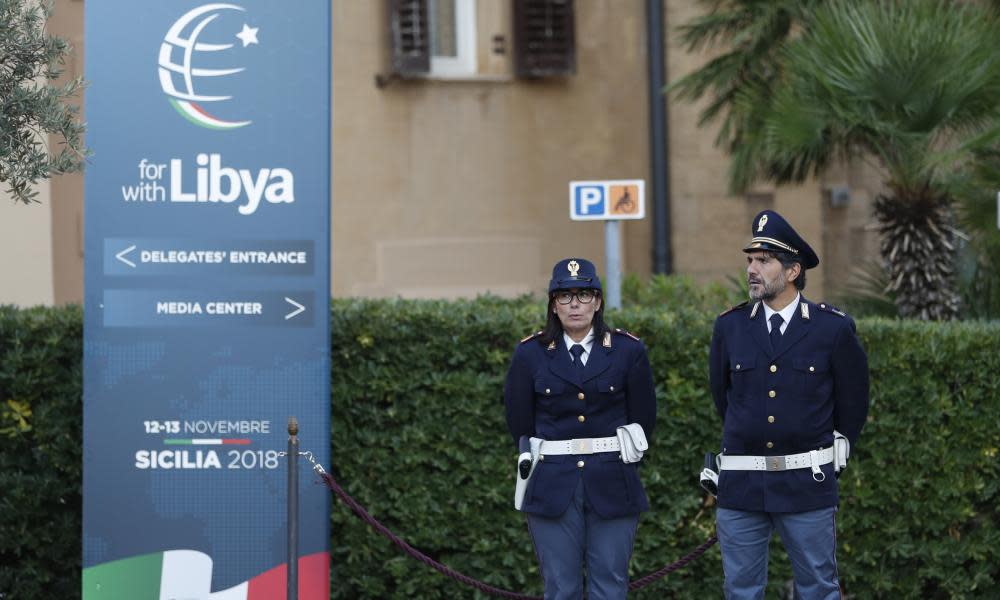Italian summit on Libya in disarray as Trump and Putin stay away

Italian diplomats have scrambled to inject momentum into a high-profile summit on the future of Libya which has opened in disarray.
Italy’s prime minister, Giuseppe Conte, had planned to use the conference in Palermo on Monday to confirm his country as the leading European power broker in Libya and timed it to follow the weekend armistice ceremonies in Paris, in the hope that Donald Trump and Vladimir Putin would travel on to the Sicilian city.
Six hours after the conference started, however, the attendance list was in flux. Conte did not arrive until mid-afternoon, while the Italian foreign minister, Enzo Moavero, surprised some observers by flying to Brussels.
The dominant figure in Libya’s east, Khalifa Haftar arrived in Palermo on Monday evening, but it was not clear if he would participate in the conference. Conte’s office said that he would meet Haftar and the Libyan prime minister, Fayez al-Sarraj, in bilateral meetings.
The Italian government press office said Haftar was not having dinner with the other participants, several of them heads of state or government. Before the conference Haftar had opposed the presence of Qatar at the event.
The former Italian prime minister Matteo Renzi described the conference as “a resounding flop”, adding that credibility in foreign policy was a serious matter.
The Italians were, however, able to point to the attendance of the UN secretary general, António Guterres, the EU’s foreign policy chief, Federica Mogherini, Egypt’s president, Abdel Fatah al-Sisi, and the Russian prime minister, Dmitry Medvedev.
Conte offered to add an extra session focused on Libyan security outside the formal summit in an attempt to assuage Haftar’s objections to a conference that he claimed was overrepresented by Islamists and western politicians. Sisi’s presence may have persuaded him to attend.
The UN, on the sidelines of the two-day summit, was due to set out a plan for elections to be held in the country by next summer, following a national reconciliation conference.
A tussle for influence in Libya between France and Italy overhangs the summit. A French-Libyan summit held in Paris in May – to the annoyance of the Italians – set the date for the elections as 10 December, but that timetable has slipped.
The UN special envoy for Libya, Ghassan Salamé, speaking on the fringes of the summit, said the vote would now be held between late March and late June, but the format would depend on what was decided at the national conference scheduled for early next year.
“We want to ask at the national conference: what type of election do you want, parliamentary or presidential, and what kind of law,” he said.
Salamé said the national conference should “preferably” take place on Libyan soil, adding that surveys had shown 80% of Libyans wanted elections to end the stalemate between the country’s rival administrations, both of which have been backed by armed groups.
Leaders of the internationally recognised house of representatives, politically close to Haftar, called for the dismissal of the envoy after he criticised its members for being “time wasting”, “sterile” and wanting elections to be “resisted at all costs”.
Salamé showed no signs of backing down, insisting the Palermo conference needed to put pressure on the house for persistently refusing to approve a new election law, and generally obstructing progress.
He has been supported by his deputy, Stephanie Williams, an American whose appointment signals a reignited US interest in Libya.
Monday was devoted to technical meetings on economics, sectarian and security issues, among the main Libyan institutions and representatives of the foreign powers, the International Monetary Fund and the World Bank.
The UN has been trying to engineer a merger of the two rival central banks, starting with a financial audit of both, as well as measures to reduce corruption and the black market, and edge towards a unified security sector.
Mustafa Sanallah, the chairman of the Libyan National Oil Corporation, said: “Economic transparency was the way to guarantee the fair distribution of oil revenues and bring an end to the feelings of economic injustice that have fragmented Libya.”
He also called for those responsible for disrupting oil production or distribution to be identified and debarred from public office.

 Yahoo News
Yahoo News 
